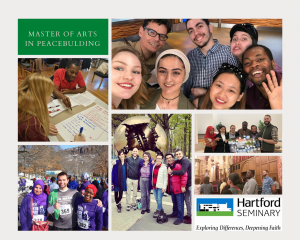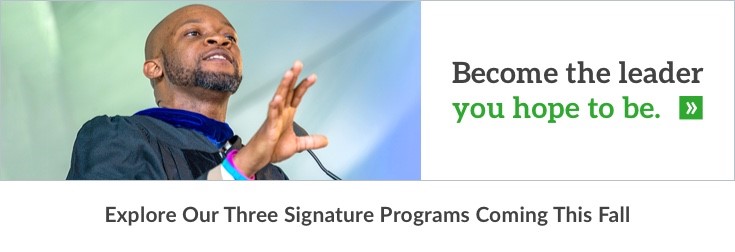About
Curriculum
Learning Outcomes
Admissions
The Master of Arts in International Peacebuilding (MAP) is a one-year, 36-credit, professional master’s degree which develops students’ capacity to build vibrant, healthy inter-and-intra-religious relationships. Students will develop interreligious literacy and acquire constructive conflict intervention skills through a combination of service learning, traditional courses, experiential courses, and project-based learning.
MAP students will be deeply engaged in creating their own transformative experience through the living and learning environment, extensive community engagement, experience-based learning, and reflective practices threaded throughout their academic work. Among other topics, students will study: the history and theology of the Abrahamic faiths, peace and violence in scripture, religious leadership, project planning, mediation, trauma awareness, and restorative justice. The student cohort will be in residence at Hartford Seminary for an academic year before completing their degree with a relationship-building capstone project in their home country or community.
Please direct any questions to Michelle Federer, Assistant Director of Recruitment and Admissions, at mfederer@hartsem.edu

| Semester | Course |
| August | IP-500: Introduction to Peacebuilding |
| Fall Semester | DI-550: Introduction to Interreligious Studies |
| IP-511: Restorative History: Building Peace After Collective Trauma | |
| IP-510: Constructive Conflict Intervention | |
| IP-520: Field Education I | |
| Intercession | IP-610: Peacebuilding Skills: Trauma & Restorative Justice |
|
Spring Semester |
IP-611: Peace, Justice, and Violence in Sacred Texts |
| IP-612: Religious Leadership for Peaceful Change | |
| Elective | |
| IP-620: Field Education II | |
|
Summer Semester
|
IP-613: Identity and Otherness in Religious Communities |
|
Capstone: Project Proposal /Personal Action Proposal –OR- Project Report/Personal Action Report |
Capstone Project or Personal Action Plan
There are four options for MAP capstones. Choosing the correct option will depend on whether or not a student is returning to a community they know well, and if they must complete their degree work in 12 months or can take some additional time (up to 16 months maximum). The four options are summarized in the matrix below.
| Returning to home community | Moving to new community | |
| Complete work in 12 months |
Student completes a Project Proposal | Student completes a Personal Action Proposal |
| Take up to 16 months |
Student works on a Project | Student works on a Personal Action Plan |
Projects vs. Personal Action Plans
Project: Students who are returning to jobs/congregations/communities they have been part of for a while will likely have opportunities to work on a project around a need that their workplace, congregation, or community has already identified. Projects address a need or solve a problem in a community; they are not simply doing things the student believes to be beneficial.
Personal Action Plan: Students who are less well integrated into the places they will go after their time at Hartford Seminary will instead map out their own theory of change as a peacebuilder, plan and begin actions they will take in relation to what they learned at Hartford Seminary in order to be an agent of that change.
Students completing their work in 12 months will submit their proposals by the end of July. Students who take more than 12 months and begin work on their projects or personal action plans will submit a report in November. There is no expectation that projects will be finished. Instead, the report will describe the work that has been done, celebrate successes, analyze obstacles faced, and most importantly, reflect on what they have learned in the process of trying to apply what they studied at Hartford Seminary.
Overall Program Mission: To foster the creativity and agency of emerging peacebuilders. To equip them to use religion as a catalyst for peacebuilding and to pursue peaceful change in religious and interreligious settings.
Through completing the MAP program, you will become capable of:
- Building the internal resources necessary to engage conflict constructively.
- Investigate your own inner world, including your motivations for participating in peacebuilding work, the mindsets you bring to conflict, your loyalties and biases, your reactions to complexity and ambiguity, and important components of your identity.
- Assess how your faith tradition and culture influence your motivations, mindsets, biases, and reactions.
- Practicing and modeling skills which build empathic relationships within groups, with the ultimate goal of nurturing communities that foster inclusivity and compassion.
- Demonstrate the skill of active listening.
- Demonstrate the skill of eliciting and sharing stories.
- Explain and practice methods of leading groups into safely engaging across significant differences.
- Explain and apply theories of social change.
- Analyze case studies and real-world situations through the lenses of web-building, contact theory, and complex contagion.
- Applying conflict transformation tools and processes.
- Evaluate case studies and real-world problems using Conflict Analysis.
- Map the Theory of Change of projects, organizations, and movements.
- Use Stakeholder Analysis as a tool for planning projects or programs.
- Practicing peacebuilding processes. Developing the capacity to choose among them, or to adapt them as needed to situations of conflict and injustice.
- Lead a multi-stage mediation role-playing exercise.
- Actively participate in a Reflective Structured Dialogue and explain the method and its uses.
- Lead a Restorative circle or conference in a role-playing exercise.
- Gaining fluency in Interreligious Studies:
- Explain and use important theoretical approaches to religious studies.
- Analyze how religions are used to think and talk about morality, ethics, and politics.
- Illustrate how religions help people promote peace or harm, both within and between communities.
- Demonstrating knowledge of Christianity, Judaism, Islam, and the history of their mutual relations.
- Articulate the basic teachings, practices, and emphases of the Muslim, Christian, and Jewish faiths, while recognizing important differences within each tradition.
- Explain major turning points in the history of relations between Jews, Christians, and Muslims.
- Analyze and compare how each tradition (Judaism, Christianity, and Islam) has been used to facilitate peacebuilding and how each tradition has been used for harm.
- Develop the willingness and capacity to critique the traditions and movements one is a part of, including shared stances toward the other.
- Practicing interreligious community-building.
- Accept and value the diverse ways that people pray, eat, prepare food, dress, and relate to each other within the program community.
- Receive and honor what it means to be Christian, Jewish, or Muslim through the eyes and experience of your religious neighbor.
Applications for the fall semester must be completed by February 1 for international students, and by February 15 for U.S. students.
Admissions Requirements:
- Prior Education: Complete official transcripts from all previous undergraduate and graduate institutions must be submitted to the Admission’s Office. A bachelor’s degree (or its educational equivalent) at a high level of achievement from an accredited institution is a prerequisite for admissions. Admission is granted only on the basis of the terms stated in the Hartford Seminary Catalogue and in the admission letter.
Applicants are required to present transcripts in English or accompanied by a certified English translation. Applicants with Non-U.S. transcripts who have been accepted into the program will be required to have them evaluated by a credential evaluation service such as Spantran, WES, or by a member organization of NACES (www.naces.org) prior to enrollment. SpanTran has created a custom application for Hartford Seminary to make sure you obtain the right kind of evaluation at a discounted rate.
- Statement of Purpose: Each Statement of Purpose is unique and is meant to be an expression of the individuals that write them. We want to know what is important to you, what has shaped you, and, ultimately, who you are. You have the opportunity to tell us about the aspects of your character and experience that help us understand why you are a good match with this program. We also want to know how you would both gain from and contribute to our unique environment.
The Statement of Purpose should reflect on:
- your goals in seeking theological education and the experiences or values that have led you to do so;
- the reasons you have chosen Hartford Seminary, in particular;
- your educational/ vocational goals;
- the life experiences that have most significantly shaped you in terms of your interest in interfaith engagement and/or peacebuilding;
- any particular issues in your community about which you are passionate.
Required length: 750-1200 words (three to five pages typed, double-spaced)
3. References: Three letters of recommendation (one academic, one related to peacebuilding or interfaith work, one character) are required.
4. Interview: Applicants who meet the minimum educational requirements and whose Statements of Purpose align with the program’s mission and goals will be contacted for an interview by the program director.
5. International Applicants: International applicants must also provide proof of a valid passport at the time of application.
6. English Language Proficiency: Students who are not native English speakers are required to submit scores of the Test of English as a Foreign Language (TOEFL), the International English Language Testing System (IELTS), or the Duolingo English Test (DET) examination and achieve a minimum score of 80 on the internet version of TOEFL or 550 on the paper based total; 6.5 on the IELTS; or 110 on the DET.
Please direct any questions to Michelle Federer, Assistant Director of Recruitment and Admission, at mfederer@hartsem.edu
Transfer Credit
Transfer credit will not be granted.
Financial Aid and Scholarships
Full scholarships are available for 2021-22 academic year.
Ready to start your application? Click one of the links below.
The MAP program is open to international students and US residents. It is fully in-person for all students, but the application process for international students requires a few additional questions. Please be sure to click the correct link!

 Sign-up now ›
Sign-up now ›